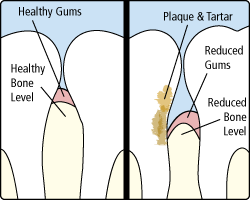GUM DISEASE AND TREATMENT
 What is gum disease?
What is gum disease?
Gum disease—or periodontal disease—is a bacterial infection of your gums.
Gingivitis is the milder form and can be reversed. Periodontitis is a more severe gum infection.
Many of us have gum disease without even knowing it because it’s virtually pain-free. Gum disease is also the most common reason for tooth loss.
What causes gum disease?
The longer plaque and tarter sit on teeth, the more dangerous they become to the health of your gums.
If the bacteria in plaque sits on your teeth long enough, the substance forms small pockets that separate your gums from your teeth. Eventually, periodontitis can cause your teeth to become loose, fall out, or—in extreme cases—it can require tooth extraction to keep the rest of your body from becoming infected.
In extreme cases, periodontitis can even be deadly.
Are you at risk of developing gum disease?
- Smoke? Chew tobacco?
- Do you have diabetes?
- Do you take certain kinds of medication, like steroids, anti-epilepsy drugs, cancer therapy drugs, calcium channel blockers, and oral contraceptives?
- Do you have ill-fitting crowns or bridges?
- Crowded teeth?
- Rough fillings that are difficult to clean around?
- Pregnancy or other hormonal changes?
While gingivitis is undetectable to most patients, tell-tale signs of severe gum disease include:
- Bleeding gums
- Extra space between the teeth and gums
- Red, swollen, and tender gums
- Bad breath (halitosis) or a bad taste in your mouth
- Pus that oozes from your gums
- Loose teeth
- A change in the growth of your teeth, or a change in your bite
- Any change in the way your partials or dentures feel in your mouth
We can help you prevent and cure existing gum disease
Typical treatments include:
- Non-surgical methods, like scaling and root planing, also known as “deep cleaning”
- Periodontal surgery
- Medications (s/a Arestin®)
Preventing Gum Disease
Regular checkups and exams are essential to your health.
There’s no need to lose your teeth to periodontal disease. It’s entirely preventable.
Brushing and flossing daily, eating a balanced diet, and scheduling professional dental visits and cleanings every six months can keep you and your gums healthy.
Let us help you practice good oral hygiene. Call us now for a consultation. We always check for signs of periodontal disease.

